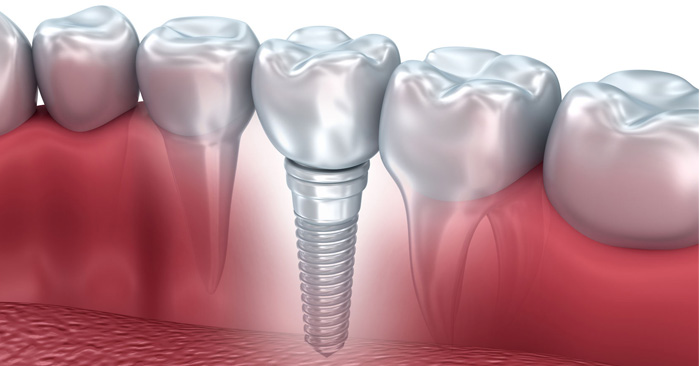The loss of one or more teeth not only reduces the chewing function but can also compromise our self-confidence and the quality of our life. Dental implantology represents a functional and aesthetic solution to replace lost teeth.
What is dental implantology
The dental implant consists of an artificial root that is inserted into the mandibular or maxillary bone. The artificial roots serve as a support for fixed prostheses, single teeth or bridges, or to stabilize mobile prostheses. Today the best implant is in titanium. Titanium has two great advantages: high resistance and biocompatibility, that is, it does not cause allergic reactions.
The operation is performed under local anesthesia and is painless. The implant can be said to be successful when, 3 or 6 months after surgery, it has completed its osseointegration process.
The risk factors of implant dentistry
Dental implantology is a complex and highly precise surgical practice. Therefore, it is important to pay close attention to certain risk factors:
Anatomy of Bone
When there is not enough bone it is not possible to insert stable implants. If, in the absence of bone, implants are inserted that are not adequate to the weight they will have to support, there is the risk of condemning the patient to the loss of the implant in a short time, with serious consequences. For these reasons it is essential to make an accurate diagnosis, which can evaluate the right amount of bone and identify possible infections.
At the Dental Office Dr. Schmitz we have high-definition digital X-ray systems that allow the accurate diagnosis of the anatomy of the mandibular and maxillary bone.
Physician Experience
Know how to evaluate the anatomy of the bone and decide if and how to insert the implants. Know how to remove possible infections, perform the implantology procedure correctly and manage all possible complications. To do these things requires a long experience in the practice of implant dentistry.
In our dental office, since 1993 we have successfully treated more than 1000 patients with severe problems of missing teeth and high aesthetic needs.
Hygiene and sterility of operating environments
Another cause of implant loss can be the development of an infection caused by bacteria in the surgical environment. To avoid this possibility, strict hygiene and sterility protocols must be followed for instruments, physicians and assistants. In addition, it is important to use an environment appropriate for surgical practice. At the Dental Office Dr. Schmitz we have a modern and efficient sterilization room, which can be visited by every patient. During the procedures, the doctor, assistants and patient wear all possible sterile protection. Implantology procedures are performed in a special room, completely lined with steel, for maximum hygiene. All the doors of the surgery are automatic, so that there is no need to use handles, a great source of pathogenic bacteria.
Quality of equipment used
The quality of the material is a key factor in the success and long life of a dental implant. Today there are many types of titanium implants, of different quality and cost. Obviously, the best ones are also the most expensive. But they are also the ones that give the greatest guarantee and safety.
At the Dental Office Dr. Schmitz we use Branemark dental implants from Nobel Biocare. With 40 years of experience and more than 1000 published articles, the Branemark System is the most scientifically documented implant system in the world. Its strengths are safety, efficacy and durability (source: Nobel Biocare).
Dental implantology – guarantees of the Studio Dr Schmitz in Rome
In light of all the possible risk factors, it is clear that it is difficult to give guarantees on the success of a dental implant.
At the Dental Office Dr. Schmitz in Rome we guarantee the osseointegration of the implants thanks to our long operating experience, the accuracy of the diagnosis, the strict hygiene protocols and the use of high quality materials. A dental implant that within 2 years after surgery has not fully integrated into the bone will be replaced free of charge. If it is not possible, it will be refunded.

